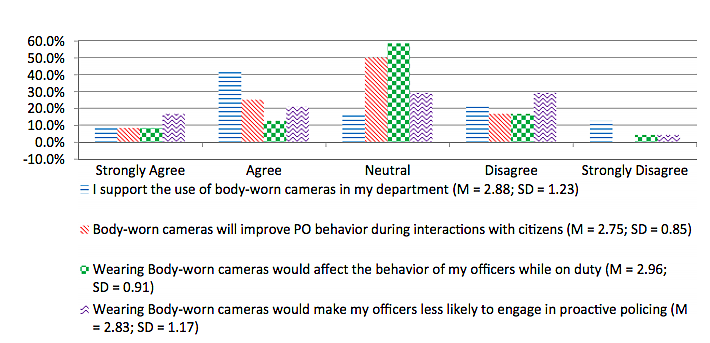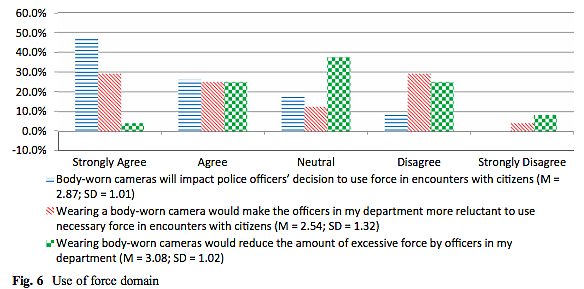Police body cameras are overwhelmingly popular across political and socio-economic demographics. However, while it is important to consider how the public views police body cameras, it is also worth noting what police law enforcement leadership thinks about the technology. Researchers from Florida Atlantic University and the University of West Florida have conducted a body camera survey on a small number of law enforcement leaders. The results show that half of police commanders would support body cameras being used in their agency and that two-thirds of commanders believe that the public supports body cameras because “society does not trust police officers.”
Survey participants were from Sunshine County, “a large southern county with 27 local law enforcement agencies, home to a number of state and federal law enforcement agencies, and a population of approximately 1.3 million people.” Each month, the leadership staff within the Sunshine County law enforcement community meet. Surveys were sent to the staff in March this year. Twenty-four surveys were completed.
The graph below shows how the respondents answered questions about the use of body cameras and their influence on police officer behavior. Fifty percent of the respondents support using body cameras in their department. The same percentage was also neutral when asked whether body cameras would improve officers’ behavior, although one-third agreed or strongly agreed.
It is too early to say definitively how the use of police body cameras affects officers’ behavior. A widely cited body camera trial in Rialto, California found that the deployment of police body cameras was followed by a reduction in complaints and use-of-force incidents (see chart below).
However, Rialto’s experience has not been replicated in every city where body cameras have been used, and it is important to keep in mind that some of Rialto’s findings could be attributed to citizens changing their behavior around officers wearing body cameras rather than officers changing their behavior. Nonetheless, as I have argued before, police body cameras should be used regardless of the relative lack of data on their impact on officers’ behavior.
The survey did show that a majority (54 percent) of respondents believe that body cameras will reduce the number of unwarranted complaints against officers. This isn’t surprising. Body camera footage has already proven useful in dismissing unwarranted complaints. For instance, body camera footage showed that a woman suspected of drunk driving had lied when she accused an Albuquerque, New Mexico police officer of sexual assault.
When it comes to use-of-force, police leaders are divided on whether body cameras will reduce officers’ use of excessive force, but a clear majority agree or strongly agree that body cameras “will impact police officers’ decisions to use force in encounters with citizens” (see graph below).
This isn’t surprising. Recently, there has been widespread coverage of police misconduct and the need for more accountability and transparency in law enforcement. Body camera footage or cell phone footage has proven invaluable in cases against officers involved in the killings of Walter Scott, Samuel DuBose, James Boyd, and 6‑year-old Jeremy Mardis. Thanks to advances in technology, many instances of alleged police misconduct can be filmed and shared widely.
Videos of police encounters, of course, don’t just include bad behavior. Body camera footage has provided us with examples of police officers behaving appropriately in difficult circumstances. Nonetheless, 66.7 percent of the law enforcement leadership indicated in the survey that they strongly agree or agree that “The use of body-worn cameras is currently supported by the public because society does not trust police officers.”
Polling data from Gallup suggests that confidence in the police is declining. As the graph below shows, the portion of Americans who say that they have a “great deal” or “quite a lot” of confidence in police is the lowest it has been since 1993. In addition, the portion of Americans who say that they have “very little” confidence in the police is the highest it has been in twenty-two years.
Of the 24 survey respondents, only three said that their agency was using body cameras. Those respondents who haven’t outfitted their officers with body cameras ought to consider that while public confidence in police is not as high as it once was, body cameras–when used with the right policies in place–offer an opportunity to highlight good policing while showing the public that they are committed to accountability and transparency. It’s an opportunity worth seizing.




